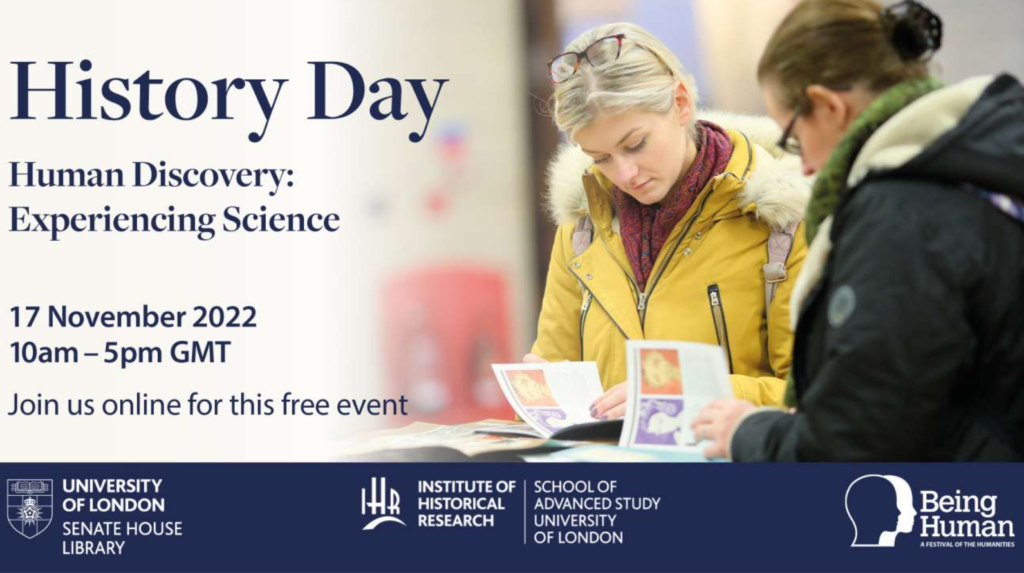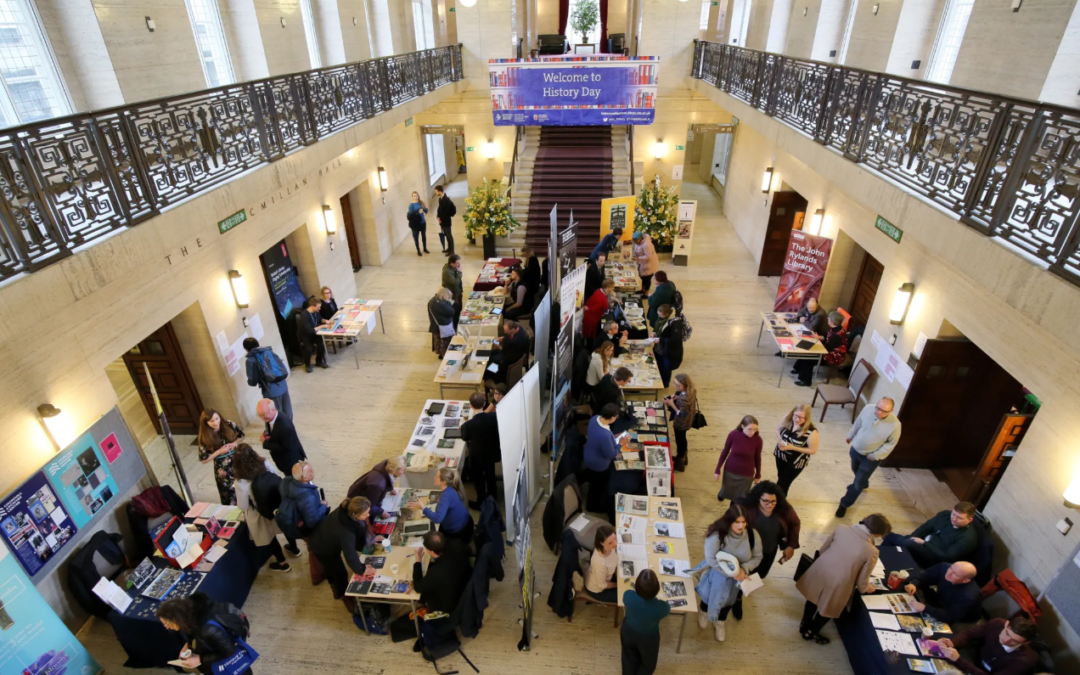Now in its ninth year, this free one-day event aims to bring together students, researchers, and anyone with an interest in history, with information professionals from libraries, archives and research organisations. Inspired by this year’s Being Human Festival theme ‘Breakthroughs’, the event explored collections on the history of science, technology, and medicine under the banner ‘Human Discovery: Experiencing Science’. With a combination of two live sessions, a new iteration of the Discover Collections gallery, and other interactive online elements, the event explored this theme in its broadest sense—including the everyday impacts of science on ordinary people.

Live sessions
‘People’s health histories and public policy’, chaired by Professor Philip Murphy from the IHR’s History and Policy forum, examined how historical perspectives gained from medical library and archival resources can support the critical analysis of recent medical crises and influence contemporary public health policy. Katie Birkwood from the Royal College of Physicians drew out fascinating contemporary resonances from the College’s archives. For example, during the mid 18th century cholera outbreaks the College recommended improvements to air quality, water supply, diet, clothing, fuel and housing as part of a package of remedies – advice paralleled in today’s health advice to survive the winter months during the cost-of-living crisis. Victoria Cranna, Archivist at the London School of Hygiene and Tropical Medicine (LSHTM), recalled two recent impacts of the School’s archives on shaping public health policy: they supported lawyers’ research for the Infected Blood Inquiry, and also the research in the papers of Sir Peter Piot—one of the team who first discovered the Ebola virus—which were used to make important decisions on how to contain the 2014-16 Ebola epidemic. Elma Brenner from the Wellcome Collection examined how medieval medical imagery reflected people’s attitudes and coping strategies towards their health, with many similarities to ours today. Medieval texts emphasised the importance of prevention and resilience by staying physically and mentally healthy to guard against disease. Isabelle Chevallot from the Guildhall Library dived into the importance of statistics by introducing the London Bills of Mortality. The public dissemination of this printed output of up-to-date mortality statistics mirrors our monitoring of Covid-19 statistics during the height of the pandemic.
The second panel ‘Everyday Tech Firsts’, chaired by Professor Catherine Clarke of the IHR’s Centre for the History of People, Place and Community, discussed the intersection between technological and social history. Dr Eve Colpus introduced the Telephonic Youth project, which uses archival, community and oral history research to examine how telephones shaped children’s lives and identities in the 1980s and 1990s. Dr Colpus talked about how telephonic “firsts” often evoked powerful emotional responses when household communication technologies changed. Similarly, Dr David Geiringer, from Queen Mary University of London, spoke about the often-ambiguous emotions that surfaced in his research on the impact of the personal computer on households during the late 20th century, using the Mass Observation Archive. For example, mass observers expressed a sense of guilt for copying and pasting and expressed sadness at the lack of the handwritten personal touch of digital text. Then Helen Day from Ladybird Fly Away Home gave a wonderfully colourful presentation on how Ladybird books between 1950-1980 illustrated technology, tracing an arc of change from the optimistic views of technology in the 1960s to a growing anxiety and insecurity peaking in the 1980s with the increasing threat of nuclear war. Finally, the panellist Louis Platman from the Museum of the Home chose objects from the collection with surprising and enduring impacts on our domestic lives. One was a piece of flat-packed furniture, illustrating the growing impermanence in home lives in the last 50 years. Participants were also encouraged to add their own experiences of “Technological Firsts” to an interactive Padlet.
The Discover Collections gallery
One of the most inspiring things about History Day is seeing the wide range of collections and themes that organisations choose to contribute for the pre-made component of the event.
Many types of collections take part from across the UK and beyond. This year, we had blog posts from local archives and museums including Surrey Heritage and Teesside Archives, online exhibitions from university libraries, archives and museums such as the University of Aberdeen’s Museum and Special Collections and a video from the University of Bristol Library about The Children of the 90s Administrative Archive. Participating organisations also included those with specialist remits, such as Bethlem Museum of the Mind and Armagh Observatory. Umbrella resources bringing together a variety of collections, such as Archives Hub, Archives Portal Europe and Library Hub Discover, were also highlighting their value to researchers.
There was some wonderful pre-made content as well from participating organisations, including The National Brewing Library at Oxford Brookes University, Our Health Heroes Digital Exhibition from Headstone Manor & Museum, Harrow, and The Story of STEM at De Montfort University. Churchill Archives Centre contributed Listening in: everyday stories of science and technology, the Sedgwick Museum of Earth Sciences shared a video on the Cambridge Svalbard Exploration Archive, and the Institute of Ismaili Studies shared some highlights on the history of science from their special collections.
One participant commented:
“The range of collections on display was fantastic, and the Padlet was really interesting and entertaining. I went to both roundtable discussions and learned a lot about two new topics. The day was well up to the high standards of previous years! Thanks to everyone involved.”
Organisations also enjoy contributing and having a chance to show their collections to new audiences. Chris Corbett, Community Engagement Officer at Teesside Archives, said:
“It is such a lovely and well-curated event; I hope you realise how much your time and effort is appreciated.”
As well as the organisations who signed up formally, it was also great to see other organisations joining in on social media on the day. If you would like to join History Day in future years you can sign up to our mailing lists.
You can explore all the content further on the Discover Collections gallery.
History Day 2023
The ability to contribute pre-made content enables participation from smaller organisations and involvement by those who can’t easily travel to London. But we have also had lots of feedback about people missing the live event of pre-2020 and the chance to meet people in-person. We are starting to plan for a hybrid History Day in 2023 and are considering options including a physical fair, streaming of videos, and live sessions offered both in-person and online. We will continue to host pre-made content as well. We have also been invited to hold a version of History Day as part of the Discovering Collections, Discovering Communities (DCDC) conference in the last two years and are beginning discussions about the 2023 event.
This blog post was written by Argula Rublack, Academic Librarian – History at Senate House Library and Kate Wilcox, Reader Experience and Technical Services Manager, IHR Library, co-organisers of History Day.

